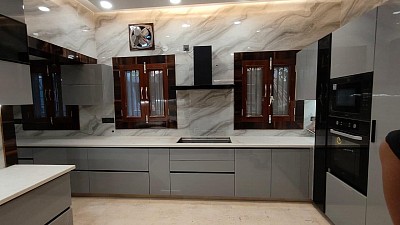Your Modular Kitchen
The centre of a modern house is a modular kitchen; hence, choosing the appropriate countertop material is important for longevity, usability, and appearance. Having so many choices makes selecting the ideal kitchen countertop material taxing. By contrasting the best countertop materials depending on durability, upkeep, affordability, and aesthetic appeal, we have created an in-depth guide to assist you in making an educated choice.
Granite: The Eternal Decision
Because of their natural beauty and durability, granite counters are among modular kitchens' most often chosen surfaces.
Pros:
Rather robust and heat, scratch, and stain resistant.
Gives the kitchen a sophisticated and rich accent.
Found in many hues and designs.
Calls for little upkeep with regular sealing.
Negative aspects include:
Based on the quality and source, it can be costly.
Heavy stuff that calls for strong cabinets.
To stop discolouration, porous surfaces must be routinely sealed.
2. Quartz: Ideal Engineered Stone
Designed stone created from crushed quartz combined with resin is quartz counters. They are readily accessible in many colours and patterns and are rather robust.
Positives:
It has a non-porous surface, which makes it quite a stain and bacterial-resistant.
Upgrade your home with a premium modular kitchen that combines elegance, functionality, and smart storage solutions for a seamless cooking experience.
It does not need sealing; it requires minimal to no maintenance.
It is found in a great spectrum of colours and patterns.
Extremely scratch-resistant and durable.
Con:
They are more costly than real stones.
Not as heat-resistant as granite; it might be damaged under too high temperatures.
3. Marble: The Beautiful Luxury
With their distinctive veining patterns, marble counters provide a traditional and timeless beauty.
Advantages:
Gives the kitchen refinement and richness.
Perfect for baking and rolling dough—cool surface.
Different veining natural stone guarantees originality.
Negatives include:
Highly porous, it is easily scratched and stained.
It demands great maintenance and regular sealing.
Cost more than other materials.
4. Versatile and flawless solid surface
Solid surface counters are made from acrylic, polyester, or both and provide a flawless and customized look.
One advantage is:
A surface without pores reduces bacterial development and discolouration.
Flawless finish, including imperceptible joints.
If scratched or damaged, it can be readily fixed.
Found in many hues and patterns.
Drawbacks:
Easy for scratches and dents.
It is not as resistant to heat as natural stone counters.
It needs constant upkeep to keep its gloss.
Enhance your kitchen's aesthetics with modern designs and smart storage solutions—visit our website for expert kitchen interior design ideas.
5. Stainless Steel: His Selection
Because of their hygienic qualities and durability, stainless steel counters are popular in business kitchens.
Positives:
Quite impervious to heat, stains, and microorganisms.
Incredibly long-lasting and strong.
Gives the kitchen a contemporary, industrial edge.
Simple to keep and clean.
Negative aspects include:
Maybe prone to dents and scratches.
Shows readily visible fingerprints and smudges.
It may be loud when utensils or kitchenware are set on it.
6. Concrete: The Industrial Trendsetter
Highly adjustable and with an industrial and modern style, concrete counters provide
Positives:
It is quite flexible with several finishes and colours.
Incredibly strong and heat-resistant.
Distinctive look with a trendy vibe.
Cons:
Sealing is needed to stop water damage and discolouration.
Over time, one can have cracks.
Heavy stuff that calls for sturdy cabinets for support.
7. Butcher Block: The Cosy and Rustic Selection
Made from wood, butcher block counters give the kitchen a natural and warm touch.
Positives:
Lends a natural, rustic appeal.
For a new look, it can be sanded and refinished.
Perfect for cooking, particularly slicing and chopping.
Negative aspects include:
Needs constant maintenance and sealing.
Scattered with water damage, dents, and scrapes.
If improperly cleaned, it can harbour germs.
8. Laminate: the Affordable Choice
Affordable in a range of colours and patterns, laminate counters are
Benefits:
Reasonable and simple to install.
It is found in a vast spectrum of colours and patterns.
It demands little upkeep.
Cons include:
Less robust than stone or quartz.
Prone to burns, water damage, and scratches as well.
Unable to be fixed if damaged.
Transform your space with sleek designs and smart storage solutions—click this link https://fursttin.com/ to explore the best modern kitchen ideas.
9. The Customizable Classic
Tile counters make customizing kitchen counters with various materials like ceramic, porcelain, or even glass tiles possible.
Advantages:
Extremely adaptable in colour, design, and size.
Economical and heat-resistant.
It is simple to install and replace individual tiles should damage calls for replacement.
Cons are:
To stop dirt accumulation, grout lines must be routinely cleaned.
If heavily impacted, it can either chip or break.
Uneven surfaces may complicate cooking.
Ultimately selecting the ideal countertop material.
Your budget, taste in design, and maintenance requirements will all influence the finest countertop material you choose for your modular kitchen. Granite or quartz is an excellent choice if you value durability and luxury. Laminate and tile are excellent choices for frugal house owners. Butcher block is a great choice for a warm and environmentally friendly appearance.
Selecting the appropriate kitchen countertop will improve your kitchen's appearance and offer long-term durability and use.
Related Blogs
Smart Kitchen: Integrating Technology into Your Modular Space
Stylish Kitchen Cabinets for Every Home
Common Mistakes to Avoid When Designing a Modular Kitchen

